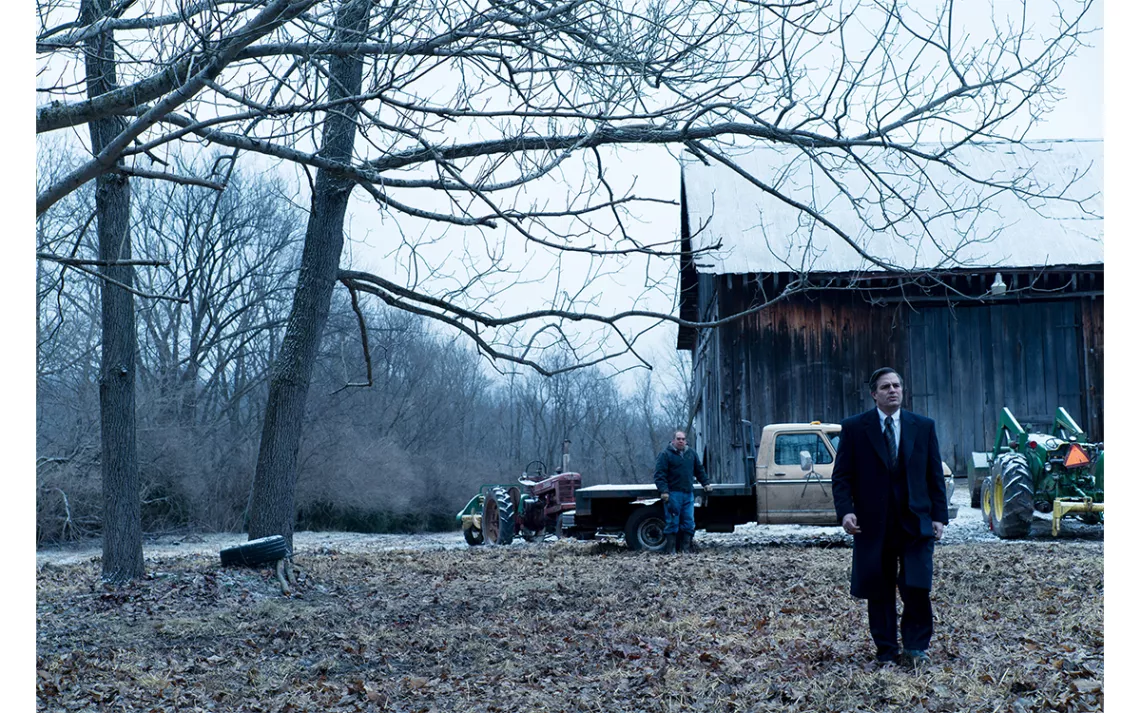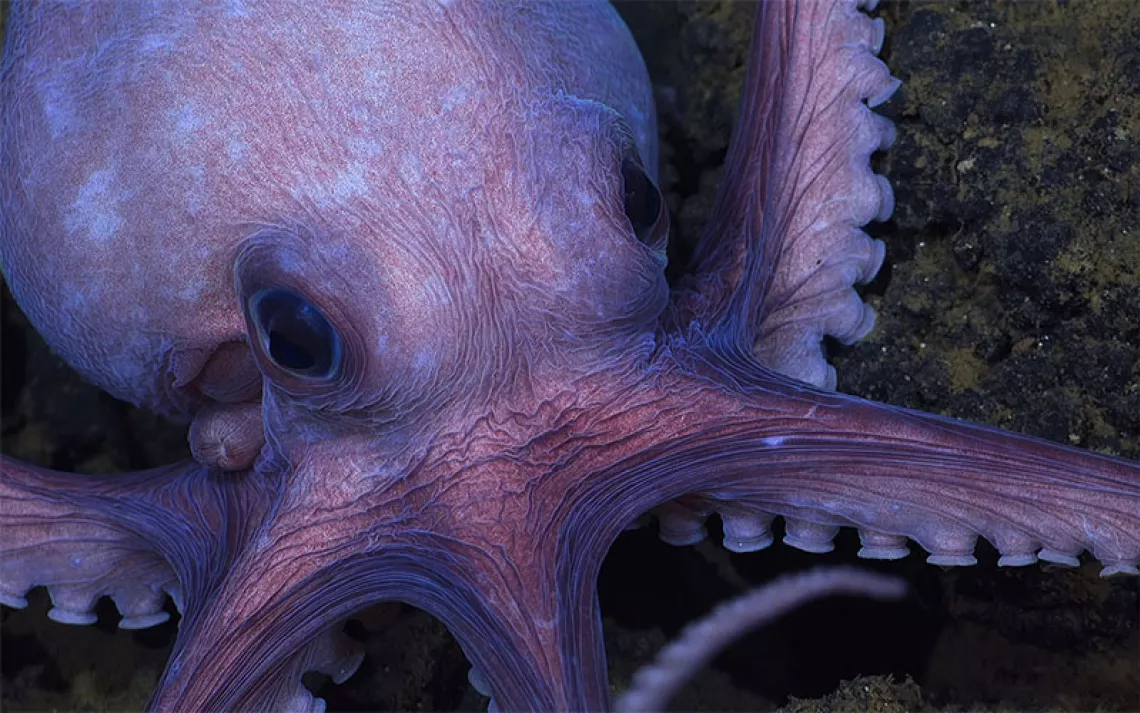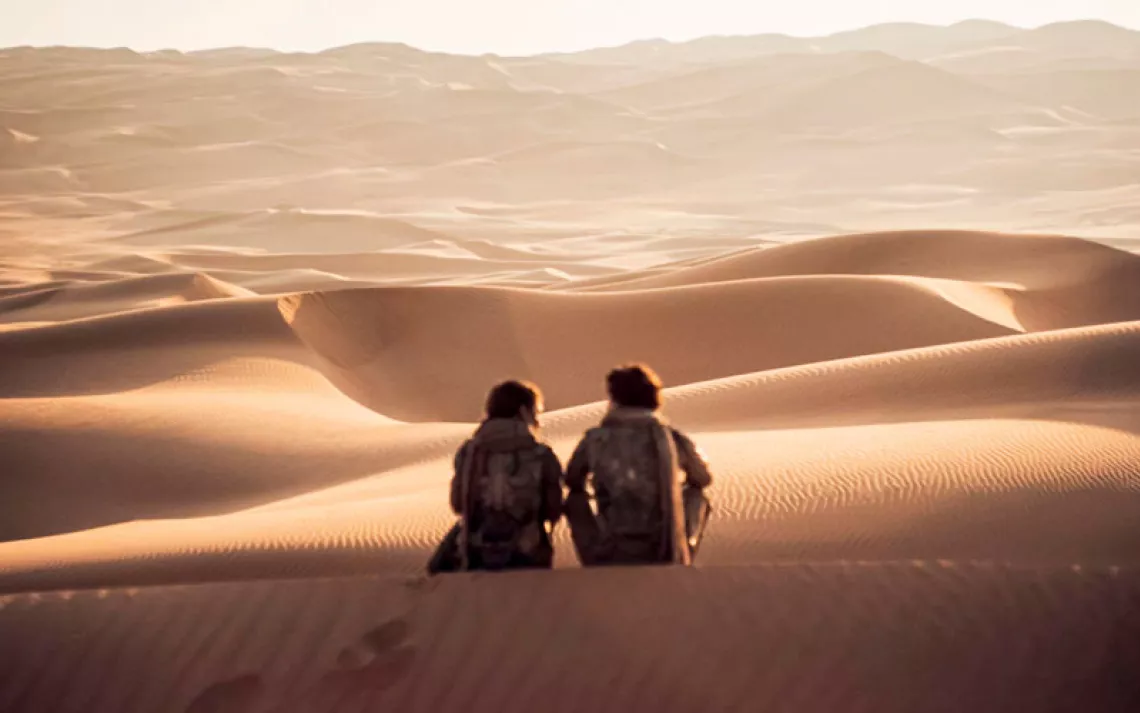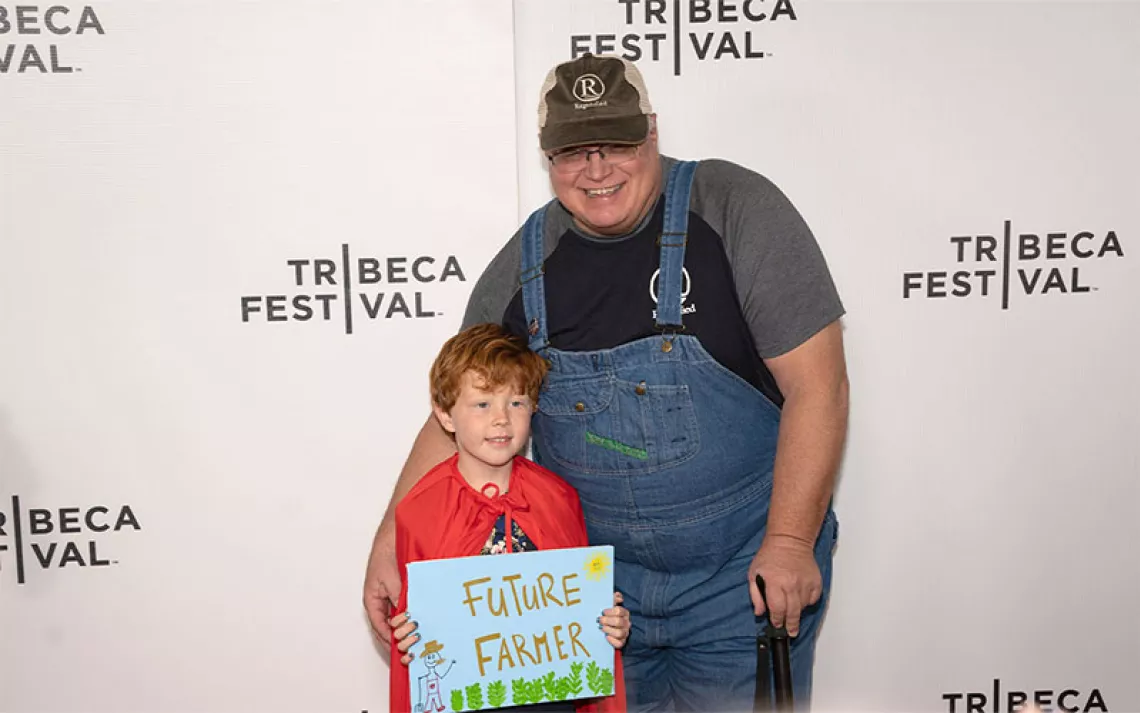Mark Ruffalo, Real-Life Eco-Hulk?
The actor talks about marrying his career with his activism in “Dark Waters”

Mark Ruffalo plays lawyer Rob Bilott in Dark Waters. | Photo courtesy of Participant Media
When Mark Ruffalo read Nathaniel Rich’s 2016 New York Times Magazine profile of Rob Bilott—an Ohio corporate attorney who uncovered how chemical company DuPont was exposing employees and US communities to dangerous pollutants—he knew it was a story made for the big screen. Bilott spent 20 years battling DuPont—manufacturer of Teflon, the synthetic coating that makes pans nonstick and outdoor gear waterproof. He helped wake America up to the fact that many of those products (not to mention food wrappers, firefighting foam, and stain-resistant carpets) contain PFAS, a class of toxic “forever chemicals” that have contaminated US water supplies and goods since the 1940s.
Ruffalo became an environmental activist a decade ago, when energy companies threatened to frack for natural gas near his farm in New York State. With Bilott's story, he envisioned a marquee movie that would alert the broader public to the toxics lurking in their day-to-day lives. That story hit screens in November with the release of Dark Waters, directed by Todd Haynes and produced by Ruffalo, who plays Bilott. The role marked a dramatic departure from Ruffalo’s recent work, such as playing the Hulk in Marvel’s Avengers series.
In his off time, Ruffalo speaks at anti-fracking rallies, protests pipelines, and campaigns for the Green New Deal. But until Dark Waters, he kept his politics and acting career separate. Sierra spoke to Ruffalo about PFAS regulation and systemic change, as well as the nuances of method acting and heroism.
***
Sierra: Over the years you’ve traveled the country denouncing oil pipelines and hydraulic fracturing for natural gas. What was it that turned you on to the toxics issue?
Mark Ruffalo: It all started with the fracking fight in New York State [in 2011], when I became so aware of how water was being contaminated by that industrial process. That’s what really moved me into the water space. So it’s something I’d been working on quite a bit, actually, since the fracking fight started.
Talk about your experience testifying before Congress last month about the need for regulation of the per- and polyfluoroalkyl substances known as PFAS, the class of toxic chemicals at the core of Dark Waters.
I started working with the Environmental Working Group, and they were organizing a day to do lobbying on the Hill, and we were invited to testify before the House Science Committee. It was interesting; I mean, only three Republicans really showed up to the hearing, but the Democrat side was full. Which was surprising to me, because I wouldn’t normally see this as a partisan issue—and things were pretty hostile on the Republican side. One guy [Representative Fred Keller (R-PA)]—instead of being concerned that people have been poisoned—his only concern was why an actor was there testifying. And then he ran away. He didn’t even wait for me to respond; he literally got up and ran away.
But I want to believe that they care about water, and that they care about the constituents being poisoned. I hope they don’t expect the taxpayers to have to pay for the cleanups of the messes these corporations made. I mean, in Dark Waters they didn’t want DuPont to pay the bill even though they made hundreds of billions of dollars off these chemicals, knowing full well they were poisoning us. So [what happened in Congress] was honestly really disappointing. I was expecting more from it than a breakdown on those levels and personal attacks on me, but I think that’s kind of the nature of Washington and definitely the nature of the Republican party right now—to avoid the facts and just attack the character of the messenger.
So far the EPA and the FDA don’t regulate PFAS whatsoever. What does effective legislation look like for you?
There’s definitely some state legislation coming up, but right now the most important thing being negotiated is the National Defense Authorization Act, the NDAA. It’s a defense spending bill, and they’re trying to address PFAS in it because obviously so much of it has been released on military bases. The Department of Defense would have to stop using it in firefighting foam, and [the act would require] that PFAS be eventually monitored in our drinking water and tap water throughout the US. It’d require DuPont, Chemours, and 3M to clean up their contamination sites, but most importantly it would designate PFAS as a hazardous substance under CERCLA [the Comprehensive Environmental Response, Compensation, and Liability or “Superfund” Act] and require cleanup to be paid by the polluters.
You’ve stated that you hope Dark Waters leads to “environmental revolution.” How do you envision that taking shape?
It all starts with leadership. Unfortunately, the one place that’s dragging its heels on these issues is Washington, DC, and so we need new leadership there—leadership that we know is going to fight for us, leadership we know will be fearless and willing to stand up to corporations, and leadership that creates a movement, or rather a mother of movements that has the organization and grassroots power to make sure that these changes take place. Luckily, we’re coming up on a 2020 election and we have a Democratic brand that I think is remarkable and refreshing and active and progressive mostly. There’s maybe one candidate in there that I feel completely confident has what it would take to make these changes real, and that’s Bernie Sanders.
If you could morph into the Hulk in real life, and use your superhero superstrength to make structural systemic changes, where would you start?
I think that first, we have to get money out of politics—we need finance reform so that our politicians aren’t so beholden to people who finance their candidacies, which makes them beholden to whomever is giving them money. Corporations cannot be allowed to pollute the scientific debate with their bogus science and doubt. That, absolutely, time and time again, has corrupted policy; it’s corrupted consumer choice, and it’s clouded the waters. It’s evil and it’s caused us so much harm, whether we’re talking about opioids or tobacco or PFAS or climate change. And in every one of these buckets—fossil fuels, fracking—you have corporations publishing bullshit science to muddy the debate, and to slow down any kind of regulation.
So that’s another thing—we have to use a cautionary principle in bringing chemicals onto the market. I’d make it incumbent upon the corporation to prove that those chemicals they’re using aren’t harming us. Because right now, it’s incumbent on us to prove they’re harming us before they’ll take them off the market. Which requires hundreds of millions of dollars that people don’t have but that corporations have. It would put the onus on them to point out that what they put out won’t kill us and make us sick.
And lastly, I’d create a state health care system. If you have that, then I promise our food and water and air is gonna get cleaned up really fast, because they will have a stake in the issue. Right now they allow us to get sick, and we have the responsibility of paying to make ourselves healthy. It’s a vicious cycle of cutthroat capitalism that is abusing us on both sides. Those are the things the Hulk would do!
What’s the atmosphere like on set when you’re making an environmental movie compared with a more traditional one? Is the whole affair more eco-conscious, with water boys shirking single-use plastic and whatnot?
Well yeah, you try to do that, but the culture is so ingrained that you might all start with the reusable water bottle, but by the end there’s only like 10 people still carrying them around. You know, it’s something that you’re always struggling against, but people are more aware of it now than ever before, and in a lot of ways my industry is the least wasteful of any. We’re constantly working to make it better.
Talk about playing a real-life versus fictional character. How did you prepare to play Rob Bilott, the lawyer who put forever chemicals on America’s radar?
It’s an awesome responsibility to actually play a real human being, so I spent as much time with Rob as I could to get a sense of his physical life, what he thought, what he believed in, what made him tick, and what the motive was to stay with something so difficult for so long, and to sacrifice so much. I went to work with him, we drove the three hours from Cincinnati to Parkersburg, West Virginia, and did a tour. I had dinner with him and his wife, and with his kids. I hung out with them and had him with me on set. I followed him around, unbeknownst to him [laughs], so that I could steal his walk. Oh, and I invaded his closet! I tried to soak him up as much as I could, and he was so generous to allow me to do so.
Rob’s a very modest and humble man, and he does not like to have attention centered on him, so it took a while for him to feel comfortable with that dynamic. He’s such a beautiful, kind person. You know, there are heroes who are heroes because you wanna be them, but Rob’s a hero because you don’t! You know? Because he makes all these hard, costly decisions that heroes have to make in order to be heroic. The grind on him and his family was very real.
You’ve been busy hosting town halls and awareness events alongside Bilott as well as community leaders and activists. What’s been most eye-opening about that experience?
Just people’s unawareness! People are shocked at the breadth and depth of this contamination story and the cover-up of it—they’re shocked and outraged and want to know what they can do. And I also think people are really inspired because right now so many of the stories we hear are about how it’s so awesome to be an asshole. Selfishness and self-centeredness are the norm; everyone is cynical and horrible, and the message is that that’s how you get ahead in life. And so when people see a story about a guy selflessly doing the right thing and sacrificing so much, I think it’s really refreshing. It’s a story people want to hear right now, and they’re reacting to it in that way. It’s enlivening to them. It’s terrifying, but I think also does viewers good.
You’re a longtime activist playing a notably understated character. Was it difficult to keep your emotions about toxics and other environmental issues in check during filming? How do you center yourself as the world around us seems to collapse?
Yes, because I’m so outraged, and so it’s easy for me to get into righteous indignation, and I like to be dramatic when I can because I’m an actor [laughs]. And that’s not Rob Bilott. Todd [Haynes] and I made a decision early on that we were just going to be as honest to him and to the story as possible. And sometimes that was not the most dramatic choice—the most demonstrative or most passionate choice—but it was the right choice, the most honest choice. And it took a lot of discipline, honestly, because he’s not our typical hero, and he’s not the hero you usually see in movies. He’s different—much more demure and shy and modest—and so, it felt gutsy to do less.
As for how I center myself, I want to hope or believe we’re in a spiritual health crisis that is going to force us to make some decisions about how we want to move forward in a way that’s better for us. Just like any other health crisis, it’s a wakeup call, and I believe that humanity will wake up and do the right thing. That said, there’s not much to prove me right, or to prove that concept right. So you could say I’m pessimistic but hopeful.
Given your activism at Standing Rock and your support of other Indigenous communities’ battles against pipelines and toxics, we’re curious about what inspires you most about such community-led resistance movements.
The people in them! The determination, the moral clarity, the meaning of life—that is such a strong part of what they’re doing, and so essential to the battles that they’re fighting. And the level of community that’s happening in those battles and those fights is profound. When I was at Standing Rock, you wouldn’t do anything without a prayer—you wouldn’t move to the front line without a prayer, and when you got to the front line there was prayer happening all around you. The act of resistance was a sacred act of protecting our mother, and so it had a gracefulness to it that was really moving to me. There’s a fearlessness and a real sense of community that I feel like a lot of us are missing, and it’s why those movements are so magnetic and charismatic to people—there’s something really profound happening there.
What do you think you’d be doing professionally if you weren’t an actor?
I’ve wondered that myself. There was nothing else I could do. I tried a lot of things [laughs]! Part of it was just attrition. There was nowhere else to go. But I guess I would’ve liked to have been a teacher, maybe.
Any plans to bring attention to any other huge systemic issues through Hollywood movies? And how do you time movies like Dark Waters to ensure audiences are ready to optimally receive them?
I think that this space is really important, but you have to tell a good story, and it sort of does have to fit the time that you’re in, and so it’s slow-going. But I definitely have my eye toward that, whether it’s more subtle, or more explicit, like in this film.
Todd Haynes and Participant and Focus Features felt audiences were ready for Dark Waters, and we did it in under three years, which is unheard of. There are movies that sort of land in the culture at a particular moment when we’re having that discussion, and this seemed right. This movie is about PFAS, but it’s also a story about us all living in a system that allows this kind of thing to happen over and over and over again. And about how it’s imperative for us to really get out there and fight for the changes we need to make.
***
To learn more about protecting yourself and your community from toxics, and to find related town halls and other events, see Participant Media's "Fight Forever Chemicals" campaign, created to coincide with Dark Waters. To read more about Bilott's battle against DuPont, check out his memoir, Exposure, released last fall from Simon & Schuster.
 The Magazine of The Sierra Club
The Magazine of The Sierra Club



